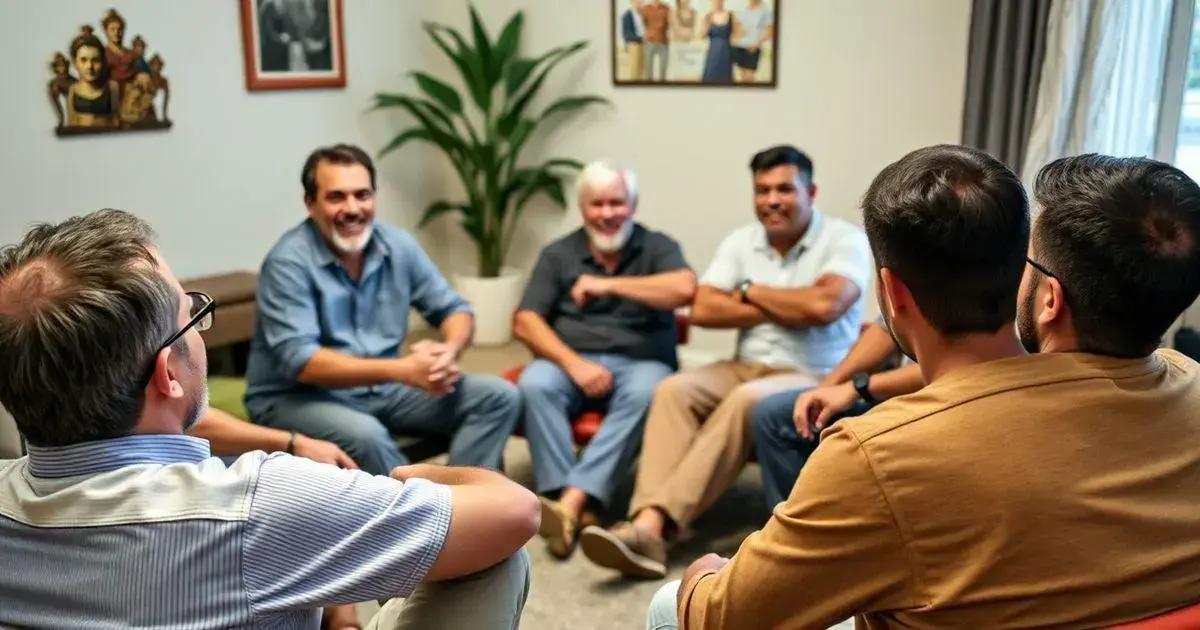The growth of mental health awareness among men is crucial for breaking the stigma surrounding emotional struggles, encouraging open conversations, and supporting men in seeking help through therapy and support groups. Media representation plays a significant role in shaping perceptions, helping to normalize discussions about mental health issues, while societal norms often create barriers. By fostering understanding and acceptance, we can promote healthier attitudes towards men’s mental health.
The Growth of Mental Health Awareness Among Men is crucial in changing societal narratives and encouraging open discussions. While historically, men have been less likely to seek help, increasing awareness is shifting this trend. In this article, we’ll explore how mental health awareness is evolving, the impact of societal norms, and why it’s important for men to embrace their emotional well-being. Join us as we delve into the realities of mental health, highlighting the role of therapy, support groups, and media representation in this vital discussion.
Understanding Mental Health Issues in Men

Understanding mental health issues in men is vital for creating a supportive environment. Many men face unique challenges that affect their mental health. Common issues include depression, anxiety, and stress, often stemming from various factors like work pressure, societal expectations, and personal relationships.
Prevalence of Mental Health Issues
Statistics show that 1 in 10 men experience depression or anxiety at some point in their lives. However, many avoid seeking help due to stigma. It’s essential to break these barriers and encourage men to express their feelings openly.
Symptoms to Recognize
Men may not always show traditional signs of mental health struggles. Instead, they might exhibit anger, irritability, or withdrawal. Recognizing these symptoms can be the first step towards getting help. Understanding these behaviors helps friends and family provide better support to those in need.
Contributing Factors
Various factors contribute to these mental health challenges. Work-related stress, lack of work-life balance, and relationship problems can take a toll. Additionally, toxic masculinity perpetuates the idea that men should be stoic and not show vulnerability, which further complicates their willingness to seek aid.
When we understand the complexities of men’s mental health, we can better support those in need. By addressing these issues openly, we help dismantle harmful stereotypes and create a culture where men feel safe to discuss their mental health.
The Impact of Societal Norms on Men’s Mental Health

The impact of societal norms on men’s mental health is significant and complex. For many years, society has set expectations for how men should behave. These traditional norms often reinforce the idea that men must be strong, stoic, and unemotional.
Toxic Masculinity Explained
Toxic masculinity refers to cultural norms that define how men are expected to act. It emphasizes traits like dominance and emotional suppression. This can lead to negative mental health outcomes, as men may feel compelled to hide their feelings or seek help.
The Role of Societal Expectations
Societal expectations can pressure men to conform to a prescribed image. Such expectations can create a sense of inadequacy when men do not meet these ideals. This pressure can lead to feelings of anxiety, depression, and loneliness.
Changing Perspectives
Fortunately, there is a movement toward redefining what it means to be a man. More people are advocating for men to express their feelings and seek help. As awareness grows, society is beginning to accept that showing vulnerability is a strength, not a weakness.
By challenging the status quo and promoting healthier perceptions of masculinity, we can help men embrace their mental health needs openly. This shift encourages conversations and support, making it easier for men to seek help when needed.
The Role of Therapy and Support Groups

The role of therapy and support groups is vital for men’s mental health. Many men struggle with emotional challenges and may find it hard to express their feelings. Therapy provides a safe space for men to discuss their emotions, thoughts, and experiences openly.
Benefits of Therapy
Therapy offers several benefits, including personalized support and coping strategies. It helps men understand their feelings and learn how to manage them. A trained therapist can guide men through difficult times, helping them become more resilient and self-aware.
Support Groups as a Resource
Support groups are another essential tool for men’s mental health. These groups create a sense of community and belonging. When men share their experiences, they often find that others feel the same way. This shared understanding builds trust and encourages open dialogue.
Breaking the Stigma
Participating in therapy and support groups helps break the stigma around mental health. As more men engage in these spaces, it sends a clear message that seeking help is both necessary and healthy. It shows that vulnerability is a part of being human and that there is strength in reaching out for help.
By focusing on therapy and support, men can develop valuable tools for managing their mental health effectively. Embracing these resources is an important part of the growth of mental health awareness among men.
How Media Representation Affects Awareness

How media representation affects awareness is a crucial topic in the discussion of men’s mental health. The media plays a significant role in shaping perceptions and attitudes. When mental health issues are portrayed honestly and sensitively, it helps normalize conversations about mental health.
Positive Representation
Positive media representation can effectively challenge stereotypes about men and mental health. Movies, TV shows, and social media that show men seeking help or discussing their feelings help break stigma. These narratives make it clear that mental health struggles are common and that seeking help is a sign of strength.
The Impact of Misrepresentation
On the other hand, negative or inaccurate portrayals can harm awareness. When men are shown as weak for feeling emotions or overly aggressive in response to emotional challenges, it reinforces harmful stereotypes. Such depictions can discourage men from expressing their feelings and seeking help. This reinforces toxic masculinity and makes awareness more difficult.
Influencing Awareness Through Campaigns
Media campaigns highlighting mental health resources can greatly impact public awareness. Programs that showcase testimonies from real men who have navigated mental health challenges serve to inspire others. These initiatives often lead to increased engagement with support systems and resources.
By considering the power of media representation, we can understand its role in fostering a culture where men’s mental health is acknowledged and supported. This shift is essential for encouraging awareness and acceptance.
In conclusion, the growth of mental health awareness among men is reshaping societal norms
Understanding mental health issues, recognizing the impact of societal expectations, and exploring the roles of therapy and support groups are critical steps toward fostering a healthier dialogue.
Media representation plays a vital part in this awareness, shaping perceptions positively or negatively. By challenging stereotypes and encouraging honest conversations about mental health, we can help men embrace their vulnerabilities.
This collective shift towards acceptance promotes a culture where seeking help is viewed as a strength. Moving forward, it is essential for society to continue breaking down barriers, fostering understanding, and supporting men’s mental health openly.
FAQ – Frequently Asked Questions About Mental Health Awareness Among Men
Why is mental health awareness important for men?
Mental health awareness is crucial for men as it helps break the stigma surrounding emotional struggles, encouraging them to seek help and support.
What societal norms impact men’s mental health?
Societal norms often promote toxic masculinity, leading men to suppress their emotions and avoid seeking help, which can negatively affect their mental health.
How can therapy benefit men dealing with mental health issues?
Therapy offers a safe space for men to express their feelings, learn coping strategies, and gain self-awareness, which is essential for their mental health.
What role do support groups play in mental health?
Support groups provide community and shared experiences, helping men feel understood and less isolated in their struggles.
How does media representation affect men’s mental health awareness?
Positive media representation can normalize discussions about mental health, while negative portrayals can reinforce harmful stereotypes and discourage men from seeking help.
What steps can be taken to encourage open conversations about men’s mental health?
Encouraging open dialogue in various settings, like workplaces and schools, and using media to showcase mental health stories can help foster acceptance and support.













